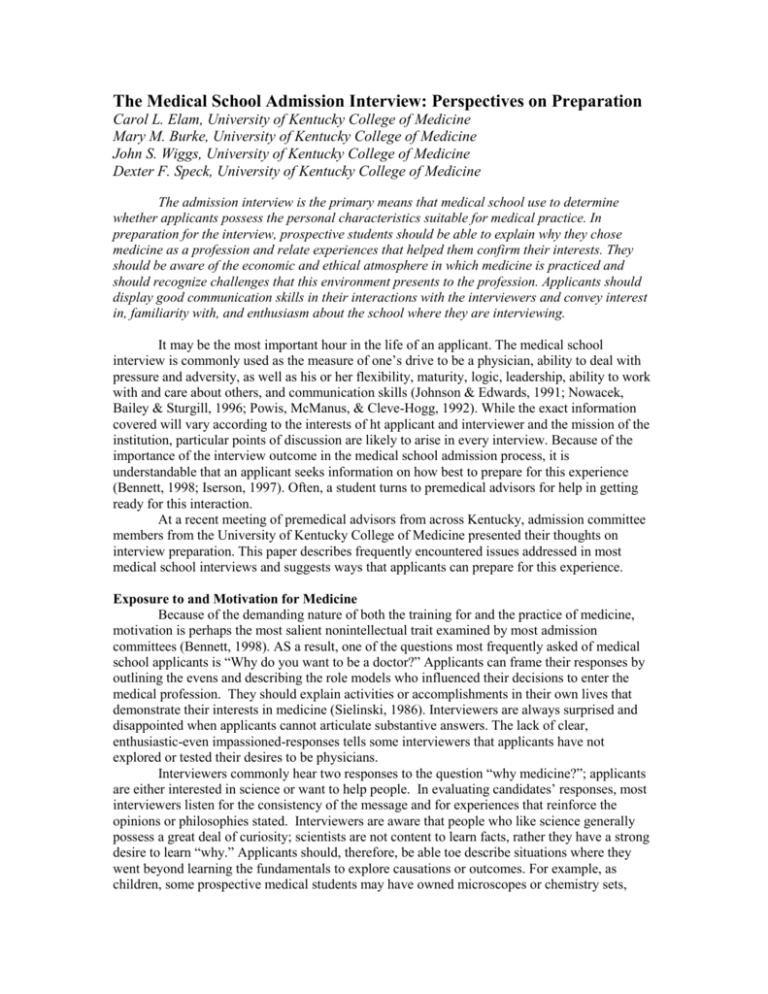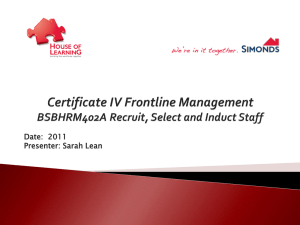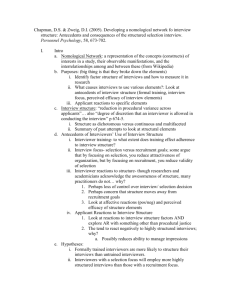The Medical School Admission Interview: Perspectives on Preparation
advertisement

The Medical School Admission Interview: Perspectives on Preparation Carol L. Elam, University of Kentucky College of Medicine Mary M. Burke, University of Kentucky College of Medicine John S. Wiggs, University of Kentucky College of Medicine Dexter F. Speck, University of Kentucky College of Medicine The admission interview is the primary means that medical school use to determine whether applicants possess the personal characteristics suitable for medical practice. In preparation for the interview, prospective students should be able to explain why they chose medicine as a profession and relate experiences that helped them confirm their interests. They should be aware of the economic and ethical atmosphere in which medicine is practiced and should recognize challenges that this environment presents to the profession. Applicants should display good communication skills in their interactions with the interviewers and convey interest in, familiarity with, and enthusiasm about the school where they are interviewing. It may be the most important hour in the life of an applicant. The medical school interview is commonly used as the measure of one’s drive to be a physician, ability to deal with pressure and adversity, as well as his or her flexibility, maturity, logic, leadership, ability to work with and care about others, and communication skills (Johnson & Edwards, 1991; Nowacek, Bailey & Sturgill, 1996; Powis, McManus, & Cleve-Hogg, 1992). While the exact information covered will vary according to the interests of ht applicant and interviewer and the mission of the institution, particular points of discussion are likely to arise in every interview. Because of the importance of the interview outcome in the medical school admission process, it is understandable that an applicant seeks information on how best to prepare for this experience (Bennett, 1998; Iserson, 1997). Often, a student turns to premedical advisors for help in getting ready for this interaction. At a recent meeting of premedical advisors from across Kentucky, admission committee members from the University of Kentucky College of Medicine presented their thoughts on interview preparation. This paper describes frequently encountered issues addressed in most medical school interviews and suggests ways that applicants can prepare for this experience. Exposure to and Motivation for Medicine Because of the demanding nature of both the training for and the practice of medicine, motivation is perhaps the most salient nonintellectual trait examined by most admission committees (Bennett, 1998). AS a result, one of the questions most frequently asked of medical school applicants is “Why do you want to be a doctor?” Applicants can frame their responses by outlining the evens and describing the role models who influenced their decisions to enter the medical profession. They should explain activities or accomplishments in their own lives that demonstrate their interests in medicine (Sielinski, 1986). Interviewers are always surprised and disappointed when applicants cannot articulate substantive answers. The lack of clear, enthusiastic-even impassioned-responses tells some interviewers that applicants have not explored or tested their desires to be physicians. Interviewers commonly hear two responses to the question “why medicine?”; applicants are either interested in science or want to help people. In evaluating candidates’ responses, most interviewers listen for the consistency of the message and for experiences that reinforce the opinions or philosophies stated. Interviewers are aware that people who like science generally possess a great deal of curiosity; scientists are not content to learn facts, rather they have a strong desire to learn “why.” Applicants should, therefore, be able toe describe situations where they went beyond learning the fundamentals to explore causations or outcomes. For example, as children, some prospective medical students may have owned microscopes or chemistry sets, conducted their own experiments, or participated in science fairs or clubs. Such simple early life experiences help convey a long-term love of science. AS college students, many science enthusiasts participated in educational experiences like tutoring or working as lab or teaching assistants. Many interviewers will look for examples of such activities. Thos applicants who profess to love science should also have given some consideration to alternate science-based careers, including research in academia or industry. They should be able to explain why the medical profession can best meet their needs to incorporate science in their professional lives. For a candidate who indicates that a primary motivation to enter medicine stems from a desire to help people, interviewers will try to determine whether the applicant has built a record that supports this assertion. During the interview, they may ask questions to discover what service-related jobs or volunteer activities the candidate has sought out. Similarly, leadership positions or active participation in clubs, charitable organizations, and community activities are important life experiences that speak to the applicant’s desire to serve. Interviewers will try to discern whether the candidate has taken part in service efforts because of a commitment to helping others or as a superficial way to enhance the medical school application. Admission committees generally believe that an applicant who ha little or no history of involvement in service activities is unlikely to change behavior patterns after becoming a physician. A proven community-oriented, service-directed student will likely continue those helping activities as a physician and positively impact the community and profession. The question of why one wants to become a physician many be asked in different forms. Some interviewers ask the duration of the candidate’s interest in medicine. Others ask whether the applicant has considered other careers. Though these questions may elicit additional information from the prospective medical student, they are intended to identify her or his motivation. If the question is not asked overtly, a candidate would be wise to communicate his or her reasons for pursuing medicine during the interview. Interviewers expect that any individual seeking to enter the medical profession will closely examine the demands of medicine through first-hand experience. In general, they are not looking at the number of volunteer or work hours in a clinical setting. Interviewers recognize that volunteer work in an emergency room once a week will provide excellent experience in trauma care; however, that experience alone would not give an applicant the complete picture of the medical profession. Rather, interviewers are concerned with the variety and quality of clinical experiences as they relate to the applicant’s broad understanding of the profession and the responsibilities inherent of a medical career. Before the interview, a candidate should have spoken with physicians about their life and work experiences in medicine as well as their frustrations and challenges (Elam, Taylor, & Strother, 1996). Committees want to avoid offering class positions to students who later decide that medicine is not form them and who opt not to complete the M.D. degree, resulting in the loss of practitioners dedicated to a lifetime of health care and service. Controversies in Medicine Another frequent line of questioning and discussion in the interview includes the applicant’s insights on some medical controversy (Zielinski, 1986). This interaction tells the interviewers that the candidate has some awareness of the wider world and that she or he is cognizant of the changes in the health care system that may have complex implications for practitioners. The sorts of topics used to initiate this discussion can range from the economic (e.g., managed care, insurance reform, or health care rationing) to the ethical (e.g., physician assisted suicide or mandatory HIV testing for pregnant women). The controversy may be one that the interviewers choose to discuss, or it may be left up to the applicant to select an argument and present the opposing position. In any case, the purpose is not to elicit a particular philosophy or political viewpoint from the applicant. Neither is the applicant expected to have extensive knowledge of the subject. Rather, this discussion gives the interviewer a chance to see that the candidate, in preparing for a career in medicine, is aware of the issues confronting the profession. The premedical advisor might assist an applicant in learning about controversial medical issues by recommending reading material or Internet sites or by providing a forum for discussion and debate in existing courses and premedical societies. Role of Life Experience Prospective medical students should carefully examine their stated career aspirations, look at their life experiences to see if they are consistent with their goals, and explore different avenues to gain further insight and confirm their objectives. Applicants need to examine their range of life experiences and be prepared to tell how their past has contributed to their medical school preparation. Most interviewers will expect candidates to discuss their medically related positions, seeking evidence that they know what it is like to work with sick people and that they have tested their talents, interests, and abilities in a medical setting. However, interviewers will likely explore nonhealth related experiences to gauge maturity and to get a sense of a broad range of personal characteristics. For example, through various activities, applicants may demonstrate leadership, dedication, commitment, perseverance in the face of adversity, time management skills, and the ability to work with others in competition or other team activities (Iserson, 1997). Work experience in nearly any job requires implementing organizational skills, establishing priorities, developing patience, and improving people skills. In particular, jobs in the service sector-such as waiting tables or clerking in retail-require courtesy, listening, and conflictresolutions skills, especially if one is dealing with angry customers. In their review of life experiences, interviewers assess whether applicants have the ability to work closely with others, set priorities, overcome adversity, manage stress, and the determination and energy necessary to see a job through to completion. Communication Skills The interview is used to assess important noncognitive characteristics of the applicant; chief among those is the ability to communicate. Powis et al. (1992) define communication skills as the ability to relate to others’ cognitive and emotional needs, provide empathy and support, and control interactions effectively. Communication skills are important, not only for physicians in their consultations with patients and their families, but also in their contacts with all members of the health care team. Communication ability is also important for students as the curricula at medical schools require that they work closely with their peers in laboratory, discussion, and clinical settings. Sowacek et al. (1996) found that communication and interpersonal skills ratings contributed most to predicting the overall impression of each applicant as measured by admission interviewer ratings. The overall interview rating is indirectly affected by such factors as language skills, length of time the applicant speaks, vocabulary, clarity of discourse, and speech habits (Johnson & Edwards, 1991). Mannerisms that influence interviewers’ impressions include amount of eye contact, gestures nervous tics, voice inflection, and volume (Molidor & Campe, 1997; Molidor & Duff, 1998). Most interviewers like to talk to applicants who are well prepared but not overly rehearsed. Anticipating questions and thinking of a framework of ideas, interests, and experiences from which to respond is preferred to devising memorized answers (Elam et al., 1996). In developing their responses, applicants need to listen closely to the question and present complete answers that are accurate and succinct, avoiding one or two word replies. In determining the length and detail of their responses, applicants should take nonverbal cues form the interviewers, noting such behaviors as nodding and smiling as encouragement to amplify the answer or looking down or shifting weight as an indication to conclude the response (Molidor & Campe, 1997). Overall, to convey communication skill sin the interview, candidates should develop their own effective conversational style and demonstrate the ability to listen as well as to the ability to speak. In addition, applicants should recognize that interviewers listen not only for the content of their responses, but also for their enthusiasm and sincerity (Zielinksi, 1986). Preparation for the Interview Because interview formats vary across institutions, an applicant should seek bulletins and brochures from the institutions to which he or she is applying to learn about their particular admission practices and procedures. Some schools use panel interviews where one (or more) interviewer speaks to one (or more) applicant. Other schools use one-to-one interviews where a candidate may have as many as three separate interviews (Johnson & Edwards, 1991). Interviewers may be physicians, basic scientists, administrators, students, residents, alumni, or community members and may (or may not) be voting members of the admission committee. Schools also differ regarding who will have access to the applicant’s file. At schools with openfile interviews, application materials, including a student’s grade s and Medical College Admission Test (MCAT) scores-are available to the interviewers. Generally their questions include reference to the applicant’s record. Prior to an open- file interview, an applicant should carefully review the submitted materials to determine whether the interviewers may detect any problem areas. It is also helpful to have a peer or advisor look over the application for important omissions or inconsistencies in the record. Effective preparation will allow a candidate to emphasize strengths, correct any misconceptions that may arise, and alleviate any concerns of the interviewers, Other schools use closed-file interviews, where interviewers have no knowledge of the applicant’s record, but often rely on a sect of core questions they ask all candidates (Elam et al. 1996). An applicant can also expect to answer an array of question types” open ended, critical incident, compare/contrast, and hypothetical (Molidor &Duff, 1998). Because the structure and format of interviews differ across institutions (and between interviewers), it is not possible to tell an applicant what to expect at all interviews across all institutions (and between interviewers), it is not possible to tell an applicant what to expect at all interviews across all institutions. However, Elam, Johnson, and Lenhoff (1994) reported that the interview period at their institution could be divided into three parts. The initial interview segment covered why the student wanted to be a physician, how he or she had become interested in medicine, information the applicant knew about the field, and his or her first-hand exposure to medicine. The second part of the interview was a review of the student’s personal background, activities, interests, and education. The final portion of the interview was reserved for applicant questions about the school and recruiting the student to the institution. Because most colleges use their interview periods to assess noncognitive skills of candidates and to showcase the academic strengths and facilities of the school and the cultural highlights of the community (Johnson & Edwards, 1991), and applicant is well served to show an active interest and intelligent concern about the institution she or he may one day be attending (Molidor & Duff, 1998; Zielinski, 1986). Role of the Interview in Admission Decisions In the 1990’s, application to medical schools increased drastically with an historic peak of 46,951 applications submitted in 1995 (Bennett, 1998). In the subsequent 3 years, the application rate slowed somewhat, but the total remained high. While grade-point average and MCAT scored contribute significantly to admission decisions, the large number of academically qualified candidates provides admission committees with the opportunity to place greater emphasis on noncognitive factors in student selection. Use of noncognitive information (letters of recommendation, personal statements, and interviews) enables admission committees to judge which applicants may have the personal characteristics and professional goals necessary to fulfill society’s health care needs. The medical interview, already a stressful experience, may take on a foreboding aura in the wake of the importance given it here. However, an applicant should not forget that the interview is inconsequential if academic performance and MCAT scores are not competitive. Success in the admission process is dependent on a strong balanced application that gives appropriate attention to both cognitive and noncognitive characteristics of the candidate. References Bennett, C. (Ed.). (1998). 1999-2000 Medical school admission requirements, 49th ed. Washington DC: Association of American Medical Colleges. Elam, C.L., Johnson, M.M.S., & Lenhoff, K.S. (1994). The medical school admission interview: Conduct and content. College and University, Vol. LXX(1), 20-27. Elam, C.L., Taylor, E.D., & Strother, E.N. (1996). Preparing for medical school and medical profession: Advice to advisors. NACADA Journal, 16(2), 34-38. Iserson, K.V. (1997). Get into medical school! Tucson, AZ: Galen Press. Johnson, E.K. & Edwards, J.C. (1991). Current practices in admission interviews at U.S. medical schools. Academic Medicine, 66(1), 408-12. Molidor, J.B. & Campe, J.L. (1997). Its show time: Mastering the art of being interviewed. The Advisor, 18 (2), 21-26. Molidor, J.B. & Duff, J.L. (1998). Watcha gonna do when they come for you? The Advisor, 18(2), 45-49 Nowacek, G.A., Bailey, B.A., & Sturgill, B.C. (1996). Influence of the interview on the evaluation of applicants to medical school. Academic Medicine, 71 (10), 1093-95. Powis, D.A., McManus, I.C., & Cleve-Hogg, D. (1992). Selection of medical students: Philosophic, political, social, and educational bases. Teaching and Learning in Medicine 4 (1), 25-34. Zielinski, R. (1986). The medical school interview. Champaign, IL: National Associate of Advisors for the Health Professions.






